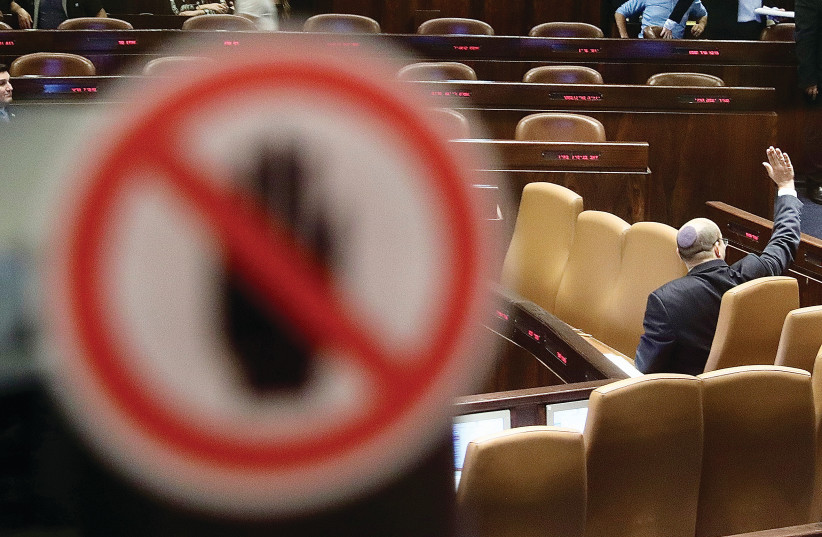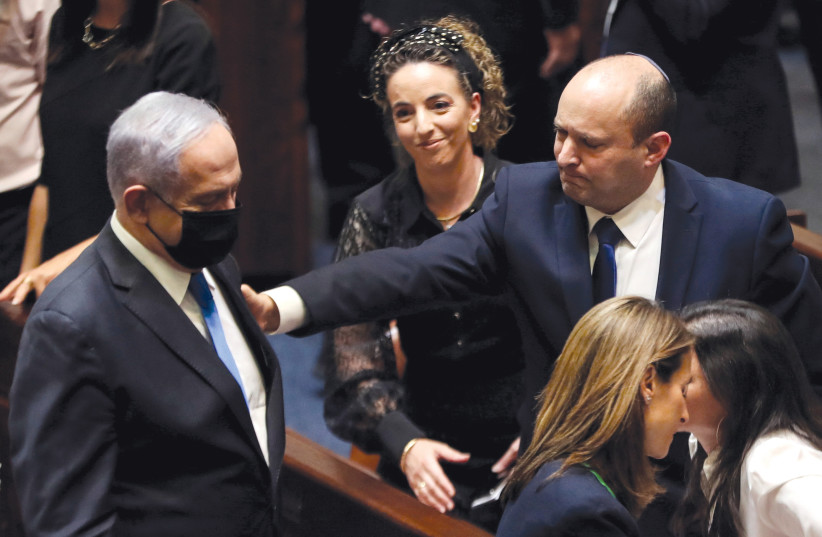Israel will hold its fifth election in under four years in the autumn.
Under the terms of the coalition agreement, Yair Lapid, head of the centrist Yesh Atid, will replace Naftali Bennett and serve as interim prime minister until a new government is sworn in.
Announcing the termination of what was called the “change government” in an emotional prime-time televised address on June 20, outgoing Prime Minister Naftali Bennett said that it was not an easy moment, but the right decision for Israel.
“A year ago, we formed a government that had seemed impossible, that stopped the severe leadership paralysis,” he said. “We formed a good government, and together we got Israel out of the slump. Israel went back to being governed.”
“We formed a good government, and together we got Israel out of the slump. Israel went back to being governed.”
Naftali Bennett
Bennett’s decision for a snap election followed weeks of a coalition crisis. When Idit Silman, from Bennett’s Yamina, quit the coalition in April, the government lost its wafer-thin majority of one. Since then, other coalition parliamentarians, from both right- and left-wing parties, have rebelled repeatedly on key votes, including extending Israeli civil law to West Bank settlers for another five years, threatening legal chaos if the bill was not passed by the end of June deadline.

Opposition leader Benjamin Netanyahu, head of the right-wing Likud, said “the worst government in Israel’s history dependent on supporters of terrorism” has come to an end. He promised that the next government, if headed by him, “will restore national pride to the citizens of Israel so that you can walk in the street with heads held high.”
Netanyahu, already Israel’s longest-serving prime minister, expressed confidence that he can return for an unprecedented sixth term as head of “a broad nationalist government.”
A historic divide
For the last few years, the historical right-left divide in Israel has been replaced by a new fault line: the pro- and anti-Bibi camps, using Netanyahu’s popular nickname.
According to a Ma’ariv poll on June 24, the two political blocs in Israel are in a dead heat, tied at 57 seats each in the 120-seat Knesset (with six seats for the predominantly Arab Joint List). Under those circumstances, neither bloc is projected to have the parliamentary majority needed to form a coalition government.
Other polls put the pro-Bibi bloc within touching distance of an overall majority, with a projected 59 or 60 seats.
As with the last four elections, a critical factor will be which of the smaller parties manages to pass the minimum threshold, which requires any party in the Knesset to gain at least 3.25 percent of the overall votes cast.
All the right-wing and religious parties in the pro-Bibi bloc are projected to comfortably pass the minimum threshold, which is enough for four Knesset seats. For the anti-Bibi bloc, the picture is more challenging: no less than four parties are hovering close to the threshold. In the Ma’ariv poll, all four parties – Yamina, Meretz, Gideon Sa’ar’s New Hope and the United Arab List (Ra’am) – just pass the threshold with four seats each.
In the polls that project the pro-Bibi bloc on the cusp of a Knesset majority, Meretz or New Hope failed to pass the threshold.
The poll projections prompted calls for a merger, or at least a temporary alliance, between the two left-wing parties, Meretz and Labor, which have previously run together.
Meretz head and Health Minister Nitzan Horowitz said that he supported a merger, arguing that Israel should have “one unified, Zionist, left-wing party.”
However, Labor leader Merav Michaeli insisted that her party would run alone.
There is also a significant question mark over the political future of Naftali Bennett, and whether Yamina will still exist by the time the election comes round.
Bennett said his decision will be based on whether his remaining in politics would contribute to healing the schism between Israel’s different sectors, as his greatest concern is that Israel could be heading for civil war. Bennett made clear his opposition to Netanyahu, but did not rule out future cooperation with him.

“Netanyahu is not the right person” to serve as prime minister, Bennett said. “His behavior is the most divisive behavior I have seen in years. But I will not invalidate anyone. If everyone rejects everyone, we will have no government, and we’ll have to go through four more elections.”
Finance Minister Avigdor Liberman, chairman of Yisrael Beytenu, has no problem rejecting other parties.
“The first goal of elections is to prevent Netanyahu from returning to power,” said Liberman. “We will not sit with Netanyahu under any conditions or reasons, nor will we sit with Shas or United Torah Judaism. We want a liberal, national government.”
“We will not sit with Netanyahu under any conditions or reasons, nor will we sit with Shas or United Torah Judaism. We want a liberal, national government.”
Avigdor Liberman
The outgoing government contained three right-wing parties – including Bennett’s Yamina – as well as center and left parties and the United Arab List, an Islamist party.
There is a clear majority of right-wing and religious lawmakers in the current Knesset, and the only thing that has prevented the formation of a stable Likud-led coalition is the refusal of the smaller right-wing parties to join a Netanyahu–led coalition.
Gideon Sa’ar from New Hope and Benny Gantz from Blue and White dismissed last-minute overtures from the Likud, reportedly brokered by Yamina’s Ayelet Shaked, to form an alternative government to prevent a fifth election. Netanyahu has earned a reputation of a politician who cannot be trusted to honor a deal, and the animosity felt toward him by other party leaders is no secret.
Israel’s shrewdest politician, 72-year-old Netanyahu is now preparing for yet another political battle, believing he can take his bloc over the winning line during the four-month campaign. The outlines of that campaign are already clear: incitement against the “terror-supporting” Arab parties and the Muslim Brotherhood, which, he claims, the Bennett-Lapid coalition relied on.
In response, Lapid warned that a new Netanyahu government will be the most extreme in Israel’s history, dominated by Religious Zionist Party MK Itamar Ben-Gvir.
“The strongest person today in the opposition is not Netanyahu, it is Itamar Ben-Gvir,” Lapid said. “Ben-Gvir’s message is simple and violent. He says no to a democratic state, no liberal values, no moderation, no rule of law, only nationalism and racism.”
“Ben-Gvir’s message is simple and violent. He says no to a democratic state, no liberal values, no moderation, no rule of law, only nationalism and racism.”
Yair Lapid
Not only is the Likud the most popular party (projected to win around 35 seats, compared with 20 or so for Yesh Atid), but the polls also show Netanyahu is by far the most desired candidate to serve as prime minister (47% to 31% for Lapid).
Much may depend on how Lapid fares in the next four months in his role as interim prime minister, and whether he can create a public image as a credible alternative to Netanyahu, despite the former premier’s vast experience.
The July visit of Joe Biden will provide an ideal opportunity for Lapid, who will be the one to welcome the US president, to cement his diplomatic credentials, as will his expected address to the UN General Assembly in New York in September, a month and a half before the election.

This is a do-or-die election for Netanyahu. For four elections in a row, he failed to cobble together a parliamentary majority, eventually allowing a bizarre coalition of the anti-Bibi bloc into power. If he fails again this time, there could well be a backlash both within Likud and among his bloc – particularly the haredi parties – to anoint a new leader for the right-wing/religious camp. If that happens, it should be relatively easy to form a Likud-led government.
Political Science Prof. Gideon Rahat of the Hebrew University of Jerusalem and a Senior Fellow at the Israel Democracy Institute said an election campaign focused on Netanyahu against Lapid will suit the Likud leader.
“I think that Netanyahu hopes that he will have one clear competitor, probably Lapid, because Netanyahu is very good in one-on-one competition, an American-like horse race, a negative campaign – he is great in that, “ he told the Jerusalem Press Club. “In previous elections, his problem was that he had many competitors. So if he will have many competitors, let’s say an alternative on the right, an alternative on the center, and the left, he will be more in trouble, and he will need to fight with all of them. He will probably choose Lapid as his competitor, but then, people say: ‘I don’t like Lapid, I don’t like Netanyahu, I will choose Bennett or Saar.’ ”
If neither the pro- nor anti-Netanyahu blocs manage to cobble together a viable coalition and Netanyahu remains Likud leader, Israel could be facing another period of political instability, similar to the chaos that triggered four elections in quick succession before Bennett’s coalition managed to govern for a year.
A comparison of leading democracies by the Israel Democracy Institute now places Israel as the most unstable, at the bottom of the list, with an election every 2.4 years. An indecisive outcome in election No. 5 could make that statistic even worse. ■
